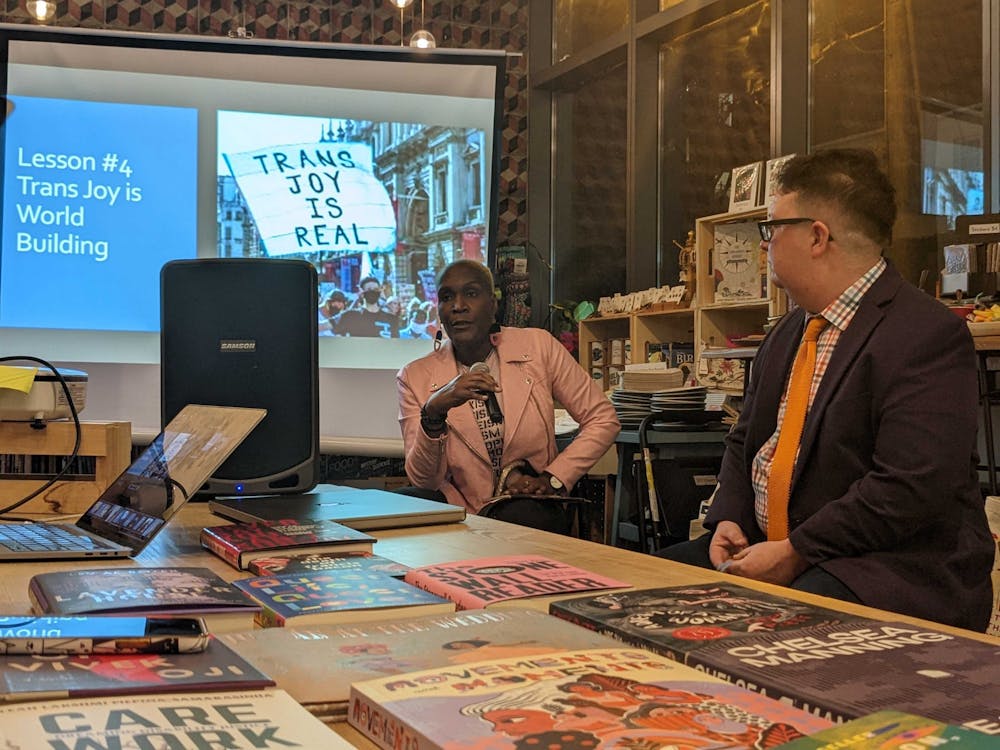Andrea Jenkins and Myrl Beam shared their work with The Tretter Transgender Oral History Project (TTOHP) and the ways storytelling can foster trans justice and empowerment on Dec. 6 at Bird in Hand cafe. The Winston Tabb Special Collections Research Center organized the event as part of a project that will create a group to record and spread trans oral histories in Baltimore.
TTOHP is a University of Minnesota Libraries initiative that seeks to collect, preserve and share the oral stories of trans community members. Jenkins is a curator for TTOHP and the first Black openly transgender elected public official in the U.S. She has held office on the Minneapolis City Council since 2017 and is currently their council president.
At the start of her speech, Jenkins recited a poem she wrote in her published book, The T Is Not Silent, titled “Requiem for the Queers or Why We Wear the Color Purple.”
The poem honored members of the LGBTQ community who died in protests and those who continue to suffer and fight today. She read the poem in the context of the Club Q shooting and World AIDS Day.
For the past 11 months, through a barrage of hate mail, Jenkins had been signing off her emails with “love”. It pushed her to fight hatred with love, even when she felt like it was difficult.
“It makes me think about my responses a little bit more — a little less vitriolic, a little less snarky and a lot more compassionate,” she said. “I invite you to consider doing that as well. Show up in public advocating for love.”
Beam, a visiting assistant professor in the Women's, Gender, and Sexuality Studies Department at Macalester College and the author of Gay, Inc.: The Nonprofitization of Queer Politics, was the next speaker. He co-hosts Transcripts, a podcast that shares stories from the Tretter Project, with Jenkins.
Beam discussed how the trans narrative popularized in the media is an inaccurate, narrow depiction of the lives trans people actually experience. He shared lessons that he learned from collecting the oral history of trans community members, the first being that trans lives flourish in community with each other.
“It is activism, not acceptance, that saves trans lives,” he said.
He highlighted that there is more trans representation in the media, but visibility does not have the same effect for everyone. Visibility can make specific groups of trans people more vulnerable to violent attacks and police exposure.
Beam also argued that the traditional idea that trans people need more rights to be safe creates a harmful narrative. He said institutions pick people with little qualifications to understand and resolve trans issues for positions where they dictate the course of trans life.
“We know that policing, affordable housing, economic justice and a bunch of other things that aren't brought up by those big mainstream organizations as trans issues are the things that will help people access safety,” he said.
Trans oral history has shown Beam that trans people are trying to reimagine the world by establishing change in the present communities they live in. He hopes that through the oral histories he collects he can tell a story of trans lives that is more nuanced and complex than the trans representation in the media.
In an interview with The News-Letter, Jenna Sylvester, a community member, said that they found the event meaningful as a trans person.
“I like the topic of oral history and understanding trans history in general, like how the physical [accounts of trans history] have been destroyed over the years and oral history has been essentially our only means to communicate,” they said.
Joseph Plaster, director of the Winston Tabb Special Collections Research Center, wrote in an email to The News-Letter about why they organized the talk.
“Our hope is that the talk will support movement building in Baltimore as well as ongoing efforts to foster a better environment for trans people on the [Hopkins] campus,” he said.
Plaster also expressed that the event was open to the whole Baltimore community, not just the Hopkins campus. Having the talk at Bird in Hand made the event accessible to any Baltimorean, not just Hopkins affiliates.
Beam concluded his talk by emphasizing the ways in which trans communities are imagining new worlds to live in.
“Instead of particular campaigns or rights, the biggest thing that I took from [these] conversations was the world-building vision of transforming... to flourish does require that sort of fundamental, foundational reorganizing, not just tinkering around the edges,” he said.





